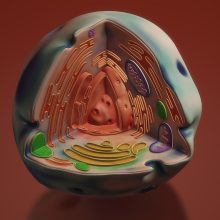Struggling to Eat a Balanced Diet? (A Multivitamin Is Your Safety Net)
Although I’m a senior citizen, I have the energy and vitality of a young adult. I’ve never had the flu or COVID-19, nor have I had a cold in more than 20years.
My secret?
A clean, nutrient-dense diet paired with a careful regimen of quality nutritional supplements.
For example, each morning I start my day with a smoothie packed with polyphenols and flavonoids, mushrooms, antioxidants, protein, organic cacao, organic flax seed, topped off with organic fruits and veggies.
After my morning meditation and exercise, I take a comprehensive multivitamin and ionic mineral complex, plus an omega-3 fish oil with breakfast. This gives me an antioxidant and nutrient boost to take on the day.
I’m also vigilant about eating quality protein – I rotate between grass-fed beef, wild-caught salmon, pasture-raised chicken and eggs, legumes, nuts, and seeds.
I stick to organic, non-GMO, high-fiber, minimally processed carbs like quinoa, oats, sweet potatoes, and Ezekiel bread.
My evening meal always consists of a huge rainbow salad consisting of a variety of organic veggies, such as arugula, spinach, garlic, onion, radishes, celery, broccoli sprouts, cilantro, cauliflower, bell peppers, and cabbage, topped off with organic olive oil and a dash of Colima sea salt. And, of course, the evening portion of my multivitamin.
Now you may be wondering . . . why would I take a multivitamin when I eat so well?
Because our soil is no longer the vitamin and mineral-rich dirt that previous generations enjoyed. Nutrient-poor soil means nutrient-depleted fruits and vegetables.
Even organic fruits and veggies are not as rich in nutrients as they used to be.
So even if you try to eat healthy, modern farming practices have substantially depleted the vitamin and mineral density of our foods over time. Relying on diet alone is unlikely to meet all of your nutritional needs.
Nutrient Deficiencies in the Modern World
In today’s fast-paced word, our diets often lack the necessary nutrients our bodies need to function at their best. The modern diet, characterized by such “food” as processed foods, fast meals, sodas, cookies, fried foods, sugary breakfast cereals, and salty snacks, often leads to nutrient deficiencies that can impact our overall health and well-being significantly.
When we don’t consume enough vitamins and minerals through our food, our bodies may suffer from various health issues.
Consider this . . . according to recent statistics, only one out of every 10 adults eat the recommended daily servings of fruits and vegetables. That means a whopping 90% of Americans are falling short of the current guidelines of 1 ½ to 2 cups of fruit per day and 2 to 3 cups of vegetables.
This means that a large majority of individuals are not getting the essential nutrients their bodies require for optimal functioning. These nutrient gaps can have detrimental effects on health, making supplementation crucial for filling these deficiencies.
Research by the Centers for Disease Control (CDC) shows about 40% of people are deficient in vitamin C, 31% in vitamin D3, 15% in vitamin B6, 12% in zinc, 10% in iron, and 7% in vitamin A. In children, nearly half are deficient in vitamin D3 and vitamin E.
Other studies reveal that more than 90% of adults fail to meet the recommended intake for vitamins D3, E, and potassium. Over 80% fall short in choline, magnesium, calcium, and vitamins A and C.
This data demonstrates just how dismally low dietary intakes are compared to recommended daily intake. A quality multivitamin bridges these major shortfalls, delivering vital nutrients that simply aren’t obtained sufficiently from food alone.
Stress Depletes Nutrient Stores
In addition to subpar nutrition from foods, stress takes an enormous toll on vitamin and mineral reserves in the body. Both physical and emotional stressors cause excess nutrient loss, while increasing demands for certain vitamins and minerals at the same time.
For instance, high stress levels deplete B vitamins, vitamin C, magnesium, and zinc. So those already-insufficient dietary intakes become even more inadequate when you factor in chronic stress. This dangerous combination makes daily multivitamin intake even more critical.
Multivitamins Offer Long-term Disease Protection
Addressing nutrient deficiencies proactively with a multivitamin provides more than just short-term benefits. It also protects long-term health. Deficiencies in nutrients like vitamin D3, selenium, B vitamins, and antioxidants are linked to higher risks of chronic disease.
For example, research shows that long-term multivitamin use cuts cancer risk, improves heart health, enhances eye health, preserves brain function and memory, prevents bone loss, and slashes stroke risk. Clearly, the small investment in multivitamins pays exponential dividends over time!
Multivitamins Benefit Seniors
Seniors, in particular, can benefit greatly from taking multivitamins to support their overall health. Multivitamins play a vital role in supporting immune function, bone health, and cognitive health in older adults.
As we age, our bodies may require additional support in maintaining these essential functions, and multivitamins can help bridge the nutritional gap that may exist due to aging or dietary limitations.
Including a daily, high-quality multivitamin can provide older adults with the necessary vitamins and minerals to keep their immune system strong, support bone density, and enhance cognitive function. By addressing specific nutrient needs through multivitamin supplementation, seniors can work towards maintaining their health and vitality as they age.
Debunking Common Myths About Multivitamins
Have you ever heard the myth that multivitamins are unnecessary if you eat a balanced diet? I have. I’ve heard this from both doctors and some journalists.
Research has shown that multivitamins play a significant role in enhancing overall health and well-being. Recent studies have demonstrated the benefits of multivitamins in filling the nutrient gaps that many individuals have in their diets.
By providing essential vitamins and minerals, multivitamins can support optimal functioning of the body and contribute to a stronger immune system. These studies emphasize the importance of incorporating multivitamins into our daily routine to ensure we are getting all the necessary nutrients our bodies require.
Understanding the Impact of Nutrient Gaps on Health
Nutrient deficiencies can have a profound impact on various aspects of our health. When our bodies lack essential vitamins and minerals, it can lead to fatigue, decreased immunity, and other health issues.
Many adults, especially seniors, may not be consuming enough nutrients through their diets alone, making supplementation crucial to bridge the nutrient gap. This is why we see many seniors suffering from various health problems.
As we get older, our bodies start running out of steam in several key areas. First, our hormone levels such as human growth hormone, testosterone, and estrogen, among others, get seriously depleted.
Our cells also become less efficient at replicating and repairing damage. We call these cells senescent (it almost sounds like senile). They contribute to aging and many chronic diseases.
On top of that, as we age our digestive enzymes that break down our food aren’t as abundant. This can significantly impact our absorption of nutrients.
Our natural immune function responses get sluggish too – the reason why 95% of Americans who died from COVID-19 were 50 years and older.
Even our joints and connective tissues lose some of their regenerative abilities increasing susceptibility to needing knee and hip replacement surgeries.
According to the CDC more than 1 million hip and knee replacements are performed each year in the United States. The vast majority of those surgeries are for seniors 65 years and older.
Basically, all the finely-tuned internal systems that kept us thriving in our prime start malfunctioning as we age. Like an old car that keeps breaking down, our bodies need extra maintenance.
That’s where good nutrition helps offset this decline. It’s like changing the oil and topping off vital fluids to keep those systems running smoothly.
For example, to maintain strong bones and prevent falls, we need vitamin D3, 12 minerals including calcium in proper proportions, and vitamin K.
B vitamins boost brain and circulatory health. Zinc supports immunity. Omega-3s reduce inflammation. Digestive enzymes allow better nutrient absorption from foods.
The list goes on – selenium, vitamin C, CoQ10. The right supplemental intake tailored to aging bodies makes a massive difference! Because let’s face it, our dietary needs change too as we get older. Supplements help fill those inevitable nutritional gaps.
So while eating a balanced, whole food diet is ideal, smart seniors know supplementation is the extra support required to stay healthy, active, and feeling youthful for longer. As a senior, this simple investment in quality vitamins, minerals, enzymes enables me to live a vibrant life during my golden years.
Choosing the Right Multivitamins and Supplements
When it comes to choosing a multivitamin supplement, understanding the differences between whole food multivitamins and synthetic supplements can greatly impact your health.
Whole food multivitamins are derived from real, natural food sources – such as fruits, vegetables, herbs, and even algae – ensuring that you get a more bioavailable form of nutrients that your body can recognize and utilize efficiently.
So when you take a whole foot vitamin or multivitamin, you’re not just getting isolated nutrients – you’re getting a whole package deal. Think of it as a nutrient-rich symphony, with various vitamins, minerals, antioxidants, and phytonutrients all working together in harmony.
You can find manufacturers of whole food multivitamins online.
On the other hand, synthetic supplements are chemically produced in a lab, often using isolated compounds that mimic the structure of vitamins found in nature. Now they can provide some benefit, especially if you have specific deficiencies or dietary restrictions. They’re also convenient and relatively inexpensive.
But here’s the catch: while they might check off the boxes on your daily recommended intake, they lack the natural complexity and synergy found in whole food sources. One more thing . . . they may not be as easily absorbed by the body, which can be a problem if you are deficient in one or more vitamins.
For example, ascorbic acid is considered a synthetic, isolated form of vitamin C, rather than the full-spectrum, food-based vitamin C complex. It lacks the array of bioflavonoids, rutin, factor K, factor J, factor P, tyrosinase enzymes and other co-factors that naturally occur alongside vitamin C in whole food sources. These co-factors aid in the absorption, transportation, and biological activity of vitamin C in the body. Without them, synthetic ascorbic acid is not as bioavailable or utilized as efficiently.
This can be a major health problem when given to people who are severely vitamin C-deficient. Dr. Robert Thompson, in his book The Calcium Lie II, states, “Ascorbic acid quickly depletes our body’s stores of this life-giving all-important vitamin C molecule.”
He adds, “Please hear me. If you have been getting IV “vitamin C” or taking large doses of ascorbic acid, quit right away and begin taking the real C molecule. Your life and health depend on making this change. If you do not, you will continue to suffer from vitamin C deficiency problems.”
Remember this . . . whole food vitamins not only offer better absorption and utilization by your body, but they come with added benefits like fiber, enzymes, and other bioactive compounds that support overall health and digestion.
So, when it comes to choosing between synthetic vitamins and whole food vitamins, it’s like deciding between a processed meal and a wholesome feast. Sure, both can fill you up, but one nourishes your body from the inside out, providing nutrients in their most natural and bioavailable form.
Optimal Timing for Taking Multivitamins
The timing of when you take your multivitamins can significantly impact their effectiveness. Some nutrients are best absorbed on an empty stomach, while others need food.
Here are a few general absorption tips:
- Fat soluble vitamins A, D, E, K – take with a meal containing a healthy fat or oil (e.g., avocados, wild caught salmon, organic extra virgin olive oil, organic coconut oil, MCT oil, organic grass-fed beef, pasture-raised eggs, nuts & seeds, organic grass-fed butter, and organic dark chocolate).
- B-complex vitamins and vitamin C – take on an empty stomach.
- Minerals like calcium, zinc, magnesium – take at night before bed.
- Probiotic capsules – take on an empty stomach (unless the label instructions tell you otherwise.
- Fish oil or digestive enzymes – take with food.
It’s essential to follow the recommended dosage instructions provided on the supplement label for optimal results.
Vitamins and Cellular Absorption
In their book The Micronutrient Miracle, nutritionists Jayson Calton PhD and Mira Calton CN have determined through their research that taking vitamins separately or in divided doses (e.g., morning and evening) can also enhance absorption by preventing vitamins from competing against each other for cellular absorption. For example, they recommend taking zinc and iron several hours apart to attain full absorption of each nutrient.
It’s like a competition in your gut – certain nutrients totally block each other from being absorbed. So even if you take a multi with good intentions, the vitamin and mineral battles in your GI tract prevent much benefit.
The Caltons say that most multivitamins have 4 major flaws:
- Mega doses of certain vitamins that can actually be dangerous when taken regularly. For instance, really high levels of vitamin A can lead to liver toxicity over time.
- Improper mineral balances where the ratios between minerals aren’t ideal for absorption. Like having way more calcium than magnesium creates competition so neither mineral gets fully utilized.
- Synthetic vitamin forms that aren’t natural and can’t be used by your cells. Your body just pees them out.
- Nutrient interactions that block each other. For example, calcium inhibits iron absorption. And vitamin C increases iron absorption but hinders zinc absorption.
The Caltons also offer these additional tips when taking vitamins:
- Look for chelated or bound mineral forms like glycinate, citrate, etc. which are more absorbable than basic oxides.
- Seek natural vitamin forms – like mixed tocopherols for E, methylcobalamin for B12, etc. Synthetics are poorly utilized.
- Minimize or avoid unnecessary additives like artificial colors, fillers, and high flow agents that can impair absorption.
- Steer clear of gummy bear versions with artificial colors and sweeteners.
- Consider a multivitamin that separates the minerals from the vitamins into AM and PM packets to maximize absorption.
- Drink sufficient water to help dissolve nutrients and prevent GI issues that interfere with absorption.
To learn more about smart supplementation and improving nutrient absorption, I recommend you read The Micronutrient Miracle. It’s eye-opening!
The Magic of Fermented Vitamins
Something else to consider . . . fermented foods and fermented vitamins. They offer a host of benefits for your health thanks to fermentation.
Fermentation is a natural process where microorganisms like bacteria, yeast, or fungi break down carbohydrates and sugars in foods. This process not only preserves the food, but also enhances its flavor, texture, and nutritional value.
Check out these benefits of fermentation magic:
- Enhanced Nutrient Absorption: Fermentation can increase the bioavailability and absorption of nutrients in foods and vitamins. During fermentation, beneficial bacteria produce enzymes that break down complex molecules into simpler forms, making it easier for your body to digest and absorb essential nutrients like vitamins, minerals, and antioxidants.
- Gut Health Support: Your gut is home to trillions of microorganisms, collectively known as the gut microbiome, which play a crucial role in digestion, immune function, and overall health. Fermented foods contain probiotics, live beneficial bacteria that can help restore and maintain a healthy balance of gut bacteria. By promoting a diverse and resilient gut microbiome, fermented foods or vitamins support digestive health, reduce inflammation, and strengthen the immune system.
- Improve Digestion: Fermented foods and vitamins are rich in enzymes produced during the fermentation process. These enzymes help break down food components, aiding digestion and alleviating symptoms like bloating, gas, and indigestion. By supporting optimal digestion, fermented foods and vitamins can enhance nutrient absorption and promote overall digestive wellness.
- Immune System Boost: The gut is closely linked to the immune system, and a healthy gut microbiome is essential for immune function. Fermented foods and probiotics can help modulate immune responses, reduce inflammation, and enhance the body’s ability to fight off infections and pathogens. By supporting immune health, fermented foods and vitamins contribute to overall well-being and resilience against illness.
Adding fermented foods to your diet or incorporating fermented vitamins into your wellness routine can help promote overall health and vitality, allowing you to thrive from the inside out.
Multivitamins Promote Long-Term Health Benefits
In closing, the scientific consensus is clear – daily multivitamin supplementation delivers measurable benefits that extend far beyond “expensive urine.” Given widespread nutritional deficiencies among all age groups, using a multivitamin to fill gaps is smart, responsible preventative health.
Multivitamins are not a magic cure-all. However, they provide a basic nutritional safety net lacking for most modern eaters. So be sure to look past the unfounded negatives and embrace the proven positives of making multivitamins part of your daily routine.
Your body and mind will thank you!







